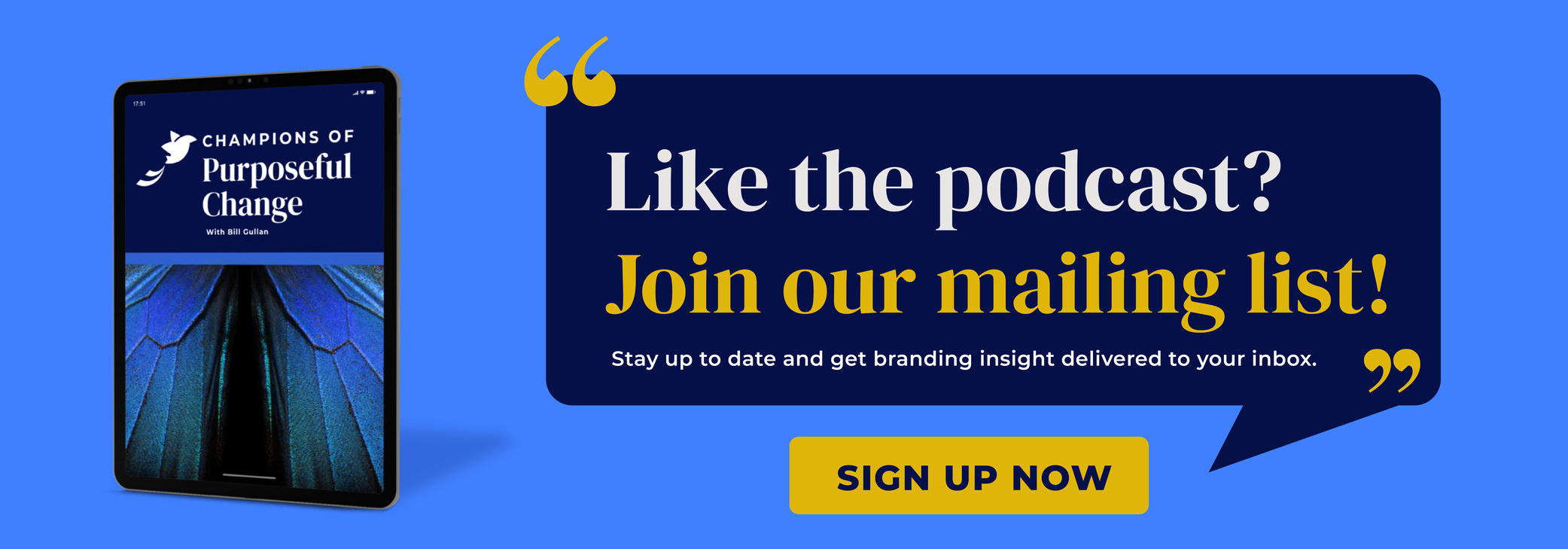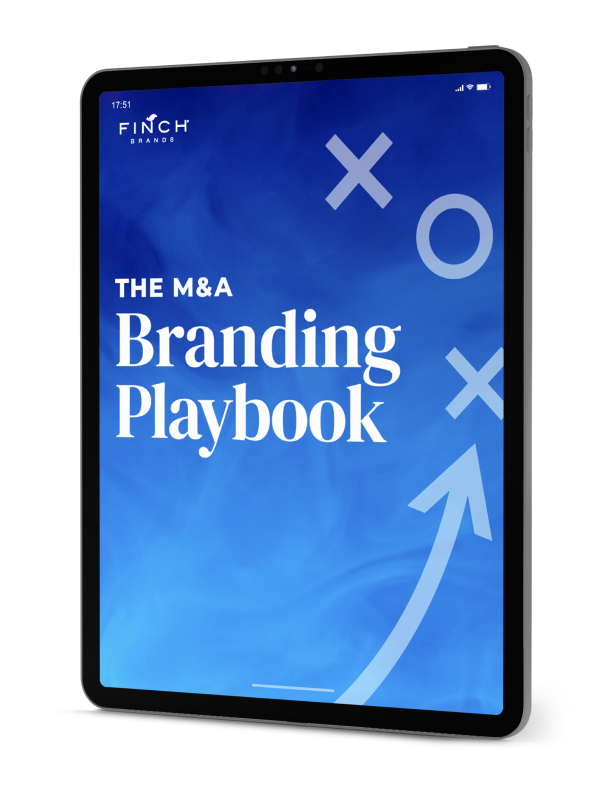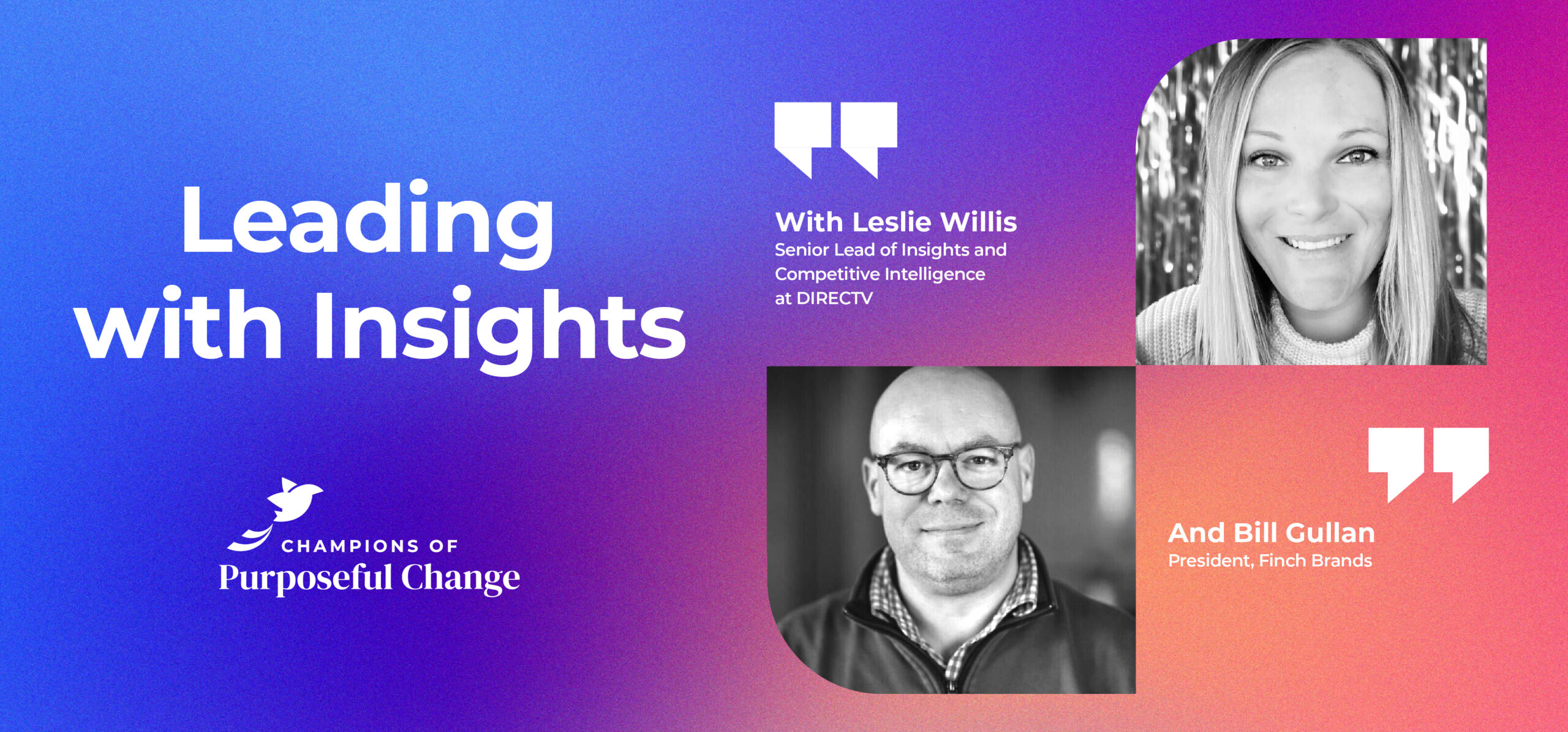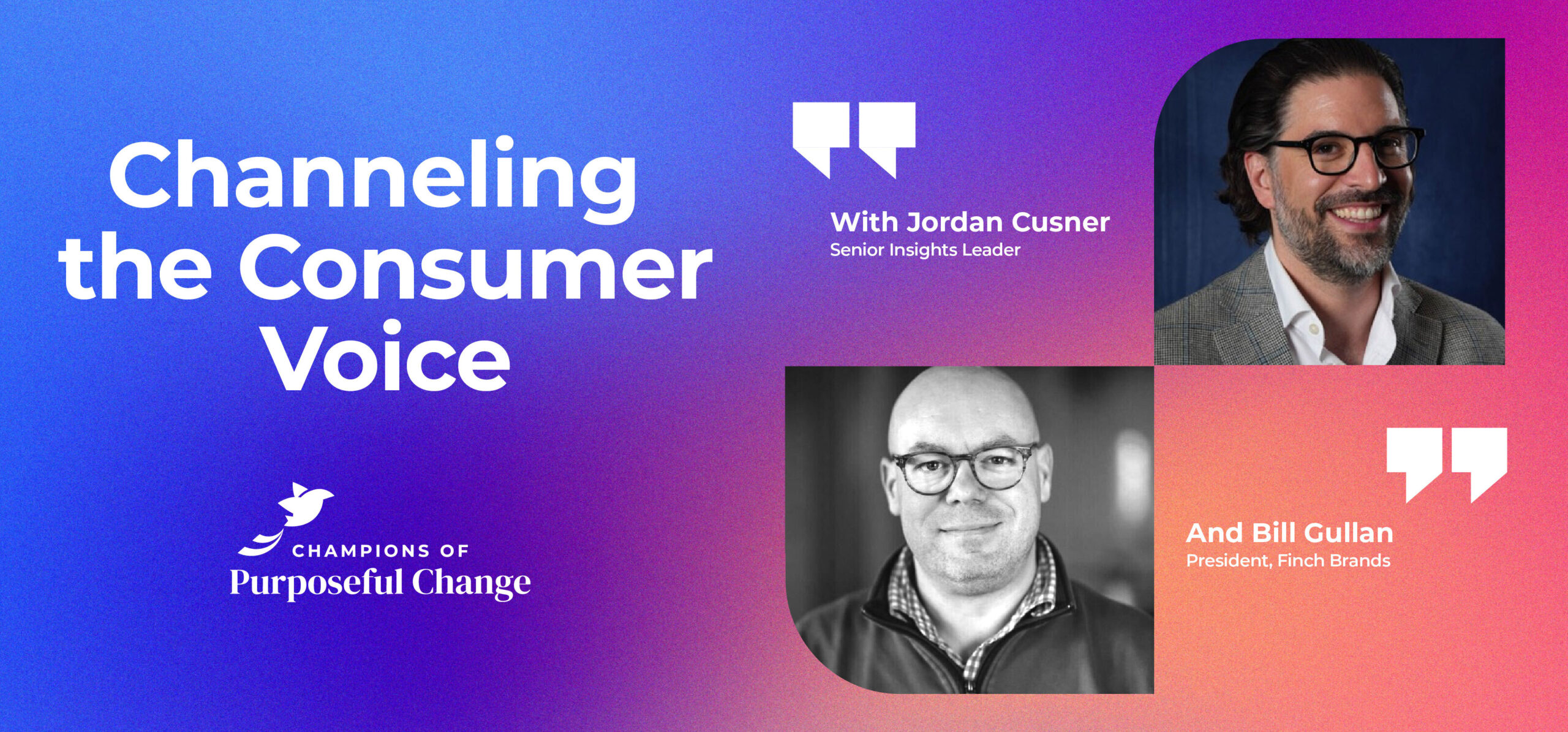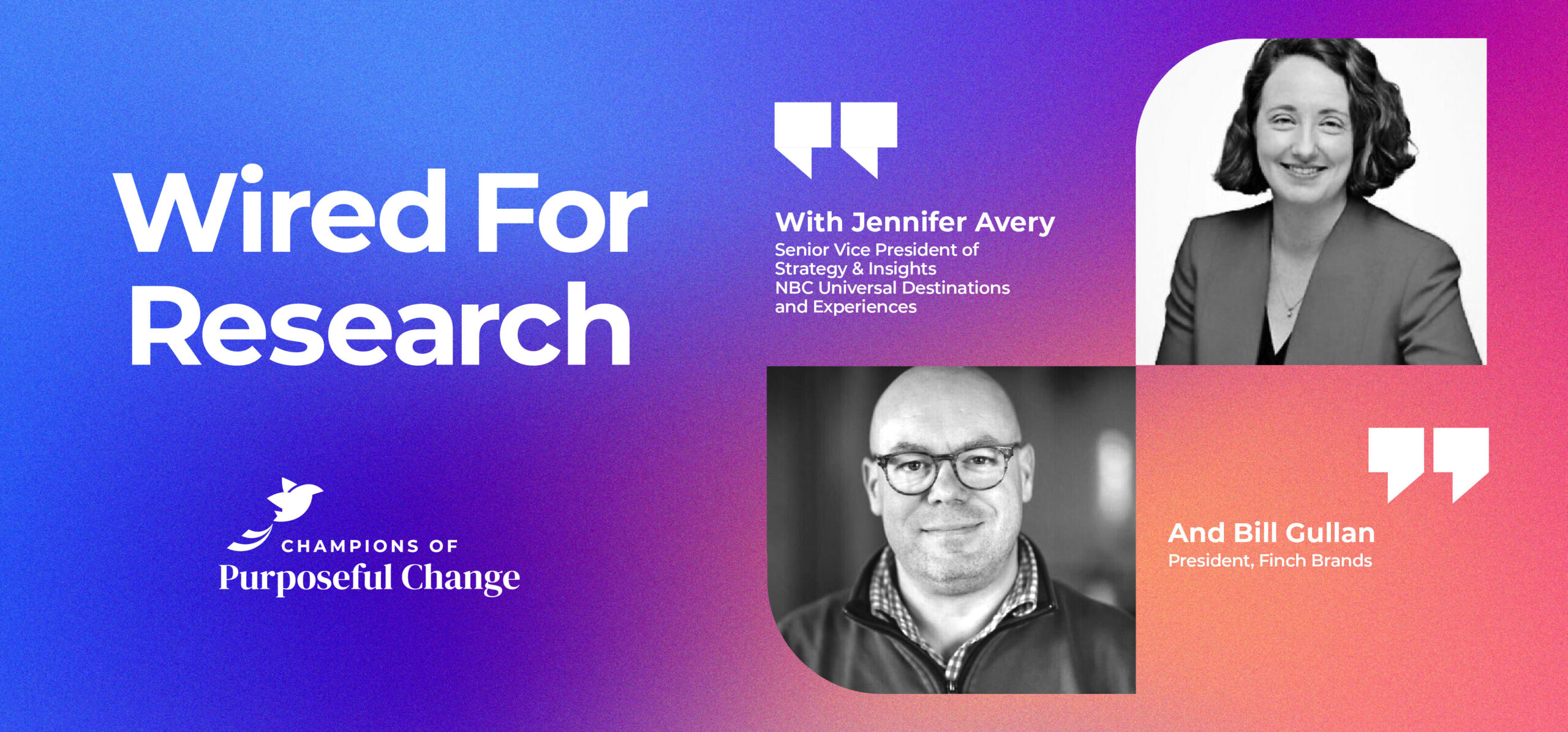Build Your Personal Brand: Erik Harbison, Co-Founder – The Marketing Help

Erik Harbison, Co-Founder of The Marketing Help, joins us today on the Real-World Branding Podcast. Erik dives deep into the necessity of personal branding in one’s own career development and how personal marketing strategy has evolved with the growing availability of digital information. If you like our podcast, please subscribe and leave us a rating!
Podcast: Download Subscribe: iTunes | RSS Transcription:
Bill Gullan: Greetings, one and all. This is Real-World Branding. I’m Bill Gullan, President of Finch Brands, the premier boutique brand consultancy, and thank you for joining us. It has long been our belief… Although in the podcast world, apparently it’s pretty difficult to do this without surveys, but it has long been our belief, that an important segment of our audience are folks who either they’re starting out, or they’re starting over, when it comes to their marketing career.
Bill: They’re interested in the topics that we cover, but they may not know yet what part of the world they want to occupy, and how they see their career developing. Well today, we have a terrific resource for folks who are in that position, and that’s Erik Harbison, who is the co-founder of The Marketing Help.
Bill: And at The Marketing Help, as he’ll tell you, he’s doing a variety of different things, but chief among them is helping to counsel digital marketers, and general marketers, on their own career development. He’s helping corporate clients think through capacity and structure of marketing departments, and he’s providing a lot of great content, for folks who seek to develop as marketers, and progress through their own career.
Bill: Erik’s career, in its own right, is a tremendous journey from so-called agency side, to so-called client side, everything in between. He’s been a really terrifically helpful adjunct professor and teacher, as well as counselor. So, enjoy Erik Harbison from The Marketing Help.
Bill: Erik Harbison, who’s the co-founder of The Marketing Help, as well as many other things that he’s accomplished in his career, is joining us through the power of technology, remotely. We’ve been apprised that there may be a tree crew in the background, and hopefully their break will last for the entirety of our conversation. Erik, thanks for joining us.
Erik Harbison: Bill, glad to be here.
Bill: Let’s start where we normally do. Your career is fascinating to me. Could you take us through some of the twists and turns, and inflection points, that have guided you towards what you’re doing now with The Marketing Help?
Erik: Yeah. I mean, way back when, I think my dream was to be an athletic trainer, because I did a lot of sports growing up. So, I felt that was going to be my path, is to do something athletically inclined, but I realized that it required a lot of chemistry courses, and things that I wasn’t really in tune with. I opted for something else.
Bill: Right.
Erik: I found influence, not just my brother, he was actually a marketing major at Temple, a couple years older than me. So, I was influenced by what he was doing, and as a kid, just was fascinated by just commercials, so something said advertising was the way to go. It’s the route I went. Finished with a degree in advertising, and then realized if I can keep on doing this and get paid for it, that’s got to be the optimal dream.
Erik: So that led to about 20 years of working for ad agencies. I picked ad agencies as a path for 20 years because I was just learning so much, no matter which agency I was working with. That was digital, traditional. Anywhere from my own agency that I started with a couple of friends, to agencies that were 500 to 1,000 plus people.
Erik: Over that time, just great experiences. Had two exits, in terms of building and getting acquired by other entities. Working on brands as small as an online retailer, as much as a major sports league. So, got to really see the ins and outs of, not just businesses and how they operate, but also how marketing can help any business, regardless of size.
Erik: Somewhere along that 20 year stretch, I realized, “You know what? Client side would probably be a good thing to do in my career, just to get the exposure and experience.” And then, about five years ago, ended up joining a B2B software company, as their Chief Marketing Officer, which was great just to be able to oversee everything. Focusing on one brand, one client, so to speak, and build a team, develop some processes, help sustain it, and identify areas of growth.
Erik: And then obviously, a couple years into that, always wondering what’s the next thing for me. And I realized, you know what? Getting back on my own, doing my own thing, if I can find a way to do that again, that’s going to be the ideal thing.
Erik: That led me to taking what was a part-time thing with The Marketing Help, turning it into a full-time thing. So, was able to identify some other projects, and really get behind making this a thing.
Bill: Yeah, it’s terrific. A couple of questions, just about about some of the twists and turns within your career. As noted, well, you’re Penn State Nittany Lion, your undergrad degree is in advertising, because of where I’ve come from, we always cast some votes on this podcast in favor of the liberal arts.
Bill: That said, I know many terrific folks who have come through an academic experience that was, not exclusively, but more pre-professional, perhaps than my background was, with Poli Sci, and all these other kinds of courses that we took.
Bill: Speak a little bit, if you would, this was early nineties, about the benefit of the advertising major, as you look back on your career, and the kind of business person that you’ve become. Talk a little bit about that academic experience initially, and how well it has served you as you reflect back.
Erik: Sure. I think, given the time, because there was no internet back when I was going through college… However, the things I learned at a foundational level, just about focusing on customer, the importance of brand, the importance of messaging, I think those things have held true, and have been influential at every stop along the way.
Erik: Even when the Internet became a thing, and I started to get into that, no one knew what to do. Everyone was kind of learning at the same time, but if you’re able to pull from some foundational knowledge, which I was able to… I mean, I remember keeping my textbook from Comm 422, and referencing that for at least the first four or five years of my career, because again, at the time, there was no true source until the Internet became a thing to be using as part of research.
Bill: Yeah. Yeah. Absolutely. And to your point about the evolution of tech as a part of the marketer’s suite, you started early on it seems, in media, and over time, evolved into… There’s some social there, and then really more deeply into digital, both on the media side, and I think beyond. Could you speak about your own evolution as a marketer, both throughout your career, and perhaps against the backdrop of the emergence of various digital techniques and approaches?
Erik: Yeah. I mean, I was someone who always wanted to do the next thing. I can remember being at my… My first agency was traditional. This was learning how to, basically, buy ads for TV, radio, print, and outdoor. And then, when the Internet division started, it became, “I got to learn more about this,” because it seemed like another option.
Erik: I can remember placing my first banner ad, that got a 82% click through rate, way back in the day. It was like, “Okay, there’s something here.” So, it’s always wanting to be driven to kind of learn the new thing, and I went through a couple cycles of that over my career. First, it was with display, then it became search. I can remember my first call with Google, way back when, when they were still offering ads on a cost-per-thousand basis.
Bill: Yeah, right.
Erik: It was an education to just understand how it works, and then if I could show results, being the person that can be counted on to teach others, and instruct others on how to… Clients, as well as team members. I liked that. So, it was search, then became social, and even one role, at one agency I was at, I took the helm to just be the guy to figure out social, craft a team, craft an offering, craft something that could be pitched to clients to help them understand how to use Facebook, for example, as a way to build community and turn into revenue. Which I mean, back in 2000 and… Geez, six seven eight? It was quite a conversation. Whereas today it’s a no brainer.
Bill: Yeah. Yeah, absolutely. Last question before we get into The Marketing Help, which I can’t wait to hear about, you mentioned your five, six year tenure at a Weber Software Company, client side as as the CMO. Speak a little bit if you would about differences between client and agency side. You mentioned that there was a point in your career when you thought that would be in your interest to go what we call client side. Speak a little bit about how that felt, what was different, what was challenging, what was sort of easy, if there was anything, and just reflect a little bit if you would on that experience.
Erik: Sure, sure. I mean I think it’s always the… I gave myself a 20 year runway to figure out working with clients like, “What’s it really like to be on the client side?” And I got feedback and insights from clients that I had worked with. And for me it was going in eyes wide open knowing that sure the benefit would be being able to focus on one brand, being able to focus a plan around a product. So the focus was a plus. Being able to focus on that one thing. However, we all know like every job has it’s challenges. So the challenges became, when you’re managing a team, it was more of the operational things became more of the day to day challenges. Whereas at an agency you have seven plus masters when you’re dealing with a list of clients.
Bill: Sure.
Erik: So you may have one master working on the client side, but then you have internal clients as well that can fill that gap of making sure that the team is challenged and they’re growing and they’re getting the support that they need.
Erik: So I think, all in, the work’s still the same. But the balance of where the focus is is the only thing that changed. But it’s also working different… I’ll call it different marketing muscles as it relates to how it’s going to be effective. So it was more strategic, it was more interaction with team, building team, and more operational projects.
Bill: Yeah. Yeah. Interesting. So let’s talk about The Marketing Help. I know that as we were going back and forth before to sort of talk about topics, one of the questions that seemingly is sort of an animating question that underlies what you’re doing now, and as you indicated before, something you’ve been passionate about for quite a while is the role of what we might call personal branding in one’s own career development. Personal branding is not a phrase that I always embrace because sometimes people mean it to, “Hey, I’m an Instagrammer and I’m taking pictures of myself drinking a beverage.”
Bill: And that’s personal branding. But you mean it very differently. Talk a little bit about what’s kind of led you here and what makes you so passionate about these types of topics that you’re dealing with at The Marketing Help.
Erik: Yeah, so I mean you think about it. 25 years in an industry, you know, hopefully you identify some trends. I mean, anyone who’s spent 25 years doing something should identify some opportunities. And that’s what I did working in marketing and The Marketing Help was kind of something that came out of identifying a gap as it relates to marketing individuals. Anyone in a marketing role where there was a gap in terms of what, you know, notice to the support not just from getting started in a marketing career, but support as you’re in your marketing career. Because not many people are contacting alumni services after the fact.
Erik: And if you’re a student trying to get into a marketing role, career services can get you so far. And let’s be honest, the interests aren’t really aligned 100%. So I was exposed to this gap, not just with teams I was building, but also on the side. I was doing some teaching at Drexel and St. Joe’s and some other colleges and I identified that you know what? Everybody wants to get the job in marketing, but no one really has the plan of attack. And no one has the resource to go to.
Erik: So I actually about 10 years ago, started a side project. Me and my business partner, Jed, we identified like, “Hey, why can’t we be the resource for marketers to get the support?” In college classes, there’s always five students that come up afterwards and say, “Hey, can I leverage your network? Can we get coffee?” And then in teams, people that I had managed over time, they left to take other jobs. They’re calling back saying, “Hey, I’ve got this challenge. Can you help me?” So why not get ahead of it and just proactively develop a resource for any marketer to access, both informational but also in terms of mentoring? You know? Just be there to be that resource to help someone navigate that career.
Bill: Right. Marketing Help’s involved in a lot of different things. You do have your own wonderful podcast, which I would highly recommend. My episode as well as all the others are probably far more interesting. But I know that there’s a lot of content that you’re generating, as well as coaching that you’re doing. Give me an example of who the… I’m sure there’s a bunch of different answers to this, but profile for me, the type of person who would find value in working with you when they think about their career. Is it someone who’s a major and really wants to get into it? Is it someone mid career looking to develop skills around digital or other sort new technologies? What are some of the pathways where it makes really good sense to consult with some of the resources that you have?
Erik: Yeah, and it’s a good question because the… How to say it… Your pie chart about it say the majority of it’s going to be students or early stage marketers, but we have worked with managers of marketing teams as well as executives. So we have not just resources, but also can be the sounding board for… What we have is basically four personas if you will. It’s associate level, which would be… Sorry, it’s student level, which is basically someone who’s about to get into and wants to get into marketing. The associate level is someone who’s taken that early stage career move. They’re a coordinator or an assistant somewhere. Then it’s manager level and that’s manager, director. And then executive. So that’s going to be director and above.
Erik: So those four tiers are the ones that are… These are the individuals in marketing that we’re here to serve with a couple of things, like you said. One is a resource, right? Just find some education. We’ve got guides that have been developed over the years of getting feedback from people that are in it, including ourselves.
Bill: Yeah.
Erik: But also offer mentoring and coaching, which are two different things, but we can provide them in ways that make the most sense for individuals, but also for teams.
Bill: So let’s just pick one of those off. I’m a student, let’s say.
Erik: Yeah.
Bill: Many would probably attest that it would benefit me to go back to school. I’m a student, I’m interested in marketing career. I may or may not be a major. Everyone’s telling me how hard it is. Everyone’s telling me that you need to network and send a bunch of resumes and show up at different events and burnish our skill sets. What is the type of mentoring or coaching? What are some things that I should be doing that maybe I haven’t thought about? Or maybe relying on the career’s office in the department or in the university or college isn’t going to get me? What are some things I ought to be doing to think about how I develop my own journey when it comes to marketing careers?
Erik: Yeah, great question because, you know, Jed and I talked about this a lot and we distilled down to one thing and that’s everyone has to have an understanding of their career profile.
Bill: Yeah.
Erik: And career profile basically is the intersection of what you know and who you know. And then oftentimes, how many times have you heard, “Oh, it’s not about what you know, it’s about who you know”? And sure that’s true in some contexts, but when it comes to your career, it’s about the balance between the two of them. So…
Bill: Yeah. Right, right.
Erik: From a what you know, it’s really just about what have been your experiences. And if you’re a student, sure they may just be academic, but you can certainly expand that with taking certifications and getting other courses, you know, supplementing your knowledge. And the who you know is about could be your professors, could be a mentor, could be your peers, could be a sorority, fraternity group, anything like that. So when you sit down… And what we would do with the students is kind of exhaust both of those entities and see and take inventory.
Erik: What do you have, you know? What do you have access to, what have you done? And then it goes into kind of a three pronged approach, which is what’s the develop… What is your path? Like where do you want to be? Even if somebody says, “Listen, I don’t know what I want to do with marketing. I just know I want a job in it.” So we work with them to identify at least a starting point. Because we all know at that stage it’s, you know, you’re probably good for 18 months, 24 months, somewhere to learn a lot. And if you go in with the right mindset, I’ve seen students really mature and succeed just by saying, “I don’t know what I want to do, but I’m going to pick this thing and go for it for the next 18 months. And then flourish when I realize what I don’t want to do as much as I realize what I do want to do.” So-
Bill: Yeah.
Erik: Building that plan, that path is kind of step one. Step two is then break off into some coaching. And by coaching, it’s, you know, I can give you a specific project to do as a student, whether it’s build your own personal website or take this certification, but also apply it. So the coaching comes in where it’s more of kind of time-based, skill-based, start and do these things sort of things. And then it’s the connection. So the third piece that we offer is career connections. So it’s between our connected networks, Jed and myself, plus, whether it’s first level or second level… I’m not saying we know everybody, but we help people get started with an exploratory conversation, an informational interview, bypassing HR just getting right to the hiring manager. So that’s been very helpful. And people, students especially, are very surprised that it can work this way. So I think they undervalue the power of the network.
Bill: Yeah, no, it definitely makes sense. And I’m sure they’re told to network, network, network, but nobody really knows what that means. And if you’re juggling… You know, I’m sure you have a really pleasant coffee with one of your parent’s friends and that just leads into five other coffees you’re supposed to have and ad infinitum. And one never knows when the time comes that that actually boils down to something. It leads them somewhere. You mentioned what The Marketing Help can do with teams. So looking at this from the other perspective, if I’m a CMO army of one or if I’m an executive within a company for which marketing has not historically been an area of organizational strength, you know? There’s many organizations that may be growing fast or that may be launching a new product or that may be looking at a new channel for whom and for which marketing hasn’t necessarily been what’s driven them in the past. How does The Marketing Help and how does your sort of experience work and support that kind of team formation objective that many of your corporate clients may have?
Erik: Yeah. So it’s interesting because the way you describe it there, I mean it’s all the above in terms of those scenarios because the smart executive marketer realizes what they don’t know and they want to fill in those gaps. So it can be a couple of things. You know, one is we can help… If you have a team, we can certainly help assess where they are in their marketing career. I think a lot of teams hire talent. They may hire… You know, everyone makes a bad hire every now and then. So we help to assess where’s the right performance and potential happening in your team. And then we take it to the next level, which is helping them to develop the team internally. Our whole goal here in working with teams is to maximize the performance of the collective team when they operate together, but also help to reduce churn.
Erik: So we want to make sure that when you hire people, you’re hiring them and you can show them a career path in marketing that is not the… It’s a supplement to what HR is providing in terms of maybe soft skills, coaching, or other general leadership development. We build roadmaps for every team member that helps them find a specific path in… Like, what the social media manager wants to focus on is a lot different than maybe the person who’s running PR or something else. So we want to make sure that there are personalized paths for each of them so they know exactly how to mature themselves as a professional in marketing specifically.
Erik: It’s also gotten to the point of helping teams identify who the best candidate could be because you think of the logic where it’s, you know, “We just lost three people. We need to back fill these roles. Who do we look for?” And everyone sees the job descriptions out there for marketing roles, whether they all came from the same template or everyone copies each other, which I know happens. And there’s nothing wrong with that. It’s just… What do you do on the back end to make sure that you’re finding the right candidates? So we help companies develop not just the description but also the process by which they would look to hire for a specific marketing role.
Bill: Yeah. Interesting. One other topic before we… I don’t want to abuse your time because you have a lot of people to help here. Your own career, as you discussed, was about adding capabilities on top of… You know, adding strength to strength, particularly as digital emerged as a driving part of the marketing stack. When you look at teams, when you look at individuals, how is digital and digital sort of competency reshaping the way marketing careers or departments are conceived and managed?
Erik: Yeah, I think it’s a… It’s something I look at as kind of a double edged sword. And from a couple of ways. I mean, I think rooted in the fact that… I mean just think of the accessibility that everybody has where… Think of the mindset of knowledge is power, right? So if you embrace the fact that it’s easy for me to find something out as much as it is, it’s easy for me to learn a new skill. So when it comes to individuals or teams, how is either the individual or the manager embracing the fact of, “How do I use knowledge is power as a benefit to help not just develop myself but develop my team?” So if you’re interviewing, and this is the thing I tell students to do all the time or anybody who’s interviewing, Google your own name first.
Bill: Right.
Bill: See what shows up because guess who’s doing that also? It’s the person who you’re about to interview with.
Erik: Sure, sure.
Bill: And if knowledge is power, so it’s like if you’ve got those fraternity party pictures that are up there, just be aware. Be aware… That’s, you know, worst case. Best case, you know, you have an article you wrote for the school newspaper or whatever, or the blog that’s… You just want to be aware. So knowledge is power from the standpoint of everything… Not Everything, but most things are accessible to start building perceptions, which in some cases can be a bad thing. Perceptions influencing what could be a perceived reality for a hiring manager or vice versa.
Bill: You do the same research on a company you want to interview with, so the expectations are kind of raised knowing that this accessibility is there, but then also… So that could be kind of a negative, but the positive is like anyone can be an expert in a weekend. And I use expert in quotes, but anyone can level up their skills because you can take a course, you can get… You can push your own development in a specific marketing area so that you’re ready for that interview, the promotion, whatever it is.
Bill: I think the problem is that I think there’s a complacency and a laziness that is infecting most of what is the… I’d say the majority of the marketing workforce right now.
Erik: Yeah. Right, right. And you’re right. There’s a lot of tools that never existed before that folks who were really lit up by all this stuff can have almost an endless level of sort of self augmentation of skills when they’re so motivated. So let’s wrap… This has been awesome. Last thing. You’ve, I think, shared some of these nuggets of wisdom across the conversation that we’ve had, but just to crystallize it, are there any particular words of wisdom that you would share with those who’ve been inspired by your path and who look at their own future development as a marketer and are very much motivated by what they’ve learned from you? Any general philosophies that are important to you or just thought you’d want to share?
Erik: Yeah, I think it comes out to, you know, just kind of the notion of the personal brand matters in the career context.
Bill: Yeah.
Erik: And you need to think about that personal brand, again, in a couple of ways. Both what do you know and who do you know and how are you leveraging those things together? Because again, like I said before, a lot of these tools and a lot of these opportunities are being under utilized just because marketers in their career are not thinking about them. So, you know, personal branding matters in terms of updating and upgrading what you know and who you know, but also it’s be a constant learner. And I said this… Someone asked me this question the other day, like, “what would you have changed, you know, five years ago?” And I said, “I would’ve gotten a mentor. I would’ve proactively found a mentor so that I could be pushed to learn consistently.” But it’s got to be a balance of both. Like you can’t just learn and then not do. You got to learn and do consistently. There’s got to be a balance there so that you’re always pushing yourself to advance, be uncomfortable, push yourself outside of your comfort zone and just constantly be learning and doing.
Bill: Terrific. That’s a great way… Great place to leave it. And this has been a wealth of insight and we’re really grateful for your time, Erik. Erik Harbison, who’s the co-founder of The Marketing Help and has accomplished so many things across his career. Thanks for your time.
Erik: Bill, I appreciate it. Thanks for having me.
Bill: Terrific insight from Erik. We’re really grateful for his participation. You should certainly check out his podcast, The Marketing Help podcast.
Bill: Yours truly is one of the probably less compelling guests as he helps people think through interesting topics related to career development and just the marketing industry as a whole. Really great work that he does and we’re grateful to Erik. Three ways to support us as always, rate, review, and I don’t know what the third R would be. I think I nailed it a couple of weeks ago. Anyway, keep the dialogue going. Give us your feedback on Twitter @BillGullan, @FinchBrands. We’d certainly love the rate. We’d certainly love the review. We’d certainly love if you’d click that subscribe button and we always love hearing feedback and ideas for future guests. So we’ll sign off at the cradle of liberty.
